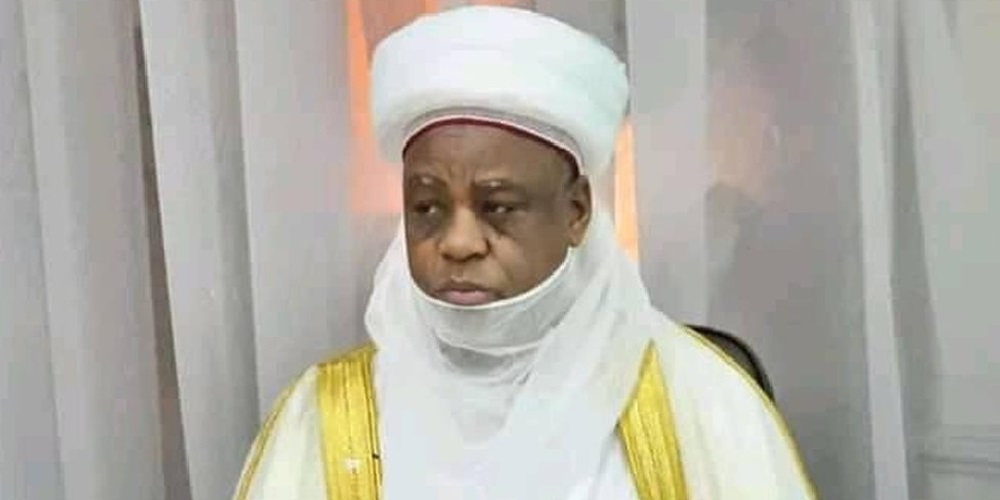News
Sokoto Govt. speaks on why law was made to reduce Sultan’s Powers

The government of Sokoto state has explained why the State House of Assembly made a law that stripped the Sultan of the power to appoint anyone.
Nasiru Binji, the state commissioner for justice, said there is no constitutional provision for the Sultan of Sokoto to make appointments, adding that the existing chieftaincy law in the state contravened the constitution of Nigeria.
Daily Trust reported that Binji made this known while speaking at a public hearing on the Sokoto Local Government and Chieftaincy Law 2008 on Tuesday, July 2.
Sokoto law that contravenes Nigeria constitution
The commissioner maintained that section 76(2) of the state law contradicted section 5(2) of the 1999 Constitution as amended. His statement reads in part: “Section 5(2) of the constitution stipulates that the executive power to appoint in the state is vested on the Governor directly or through his deputy, commissioners or any government agent assigned by the Governor.” He stressed that the above indicated that the Nigeria constitution did not empower the Sultan to appoint, but 76(2) of the Sokoto and local government and chieftaincy law gave the power to appoint district and village heads in the state to the Sultanate council.
MURIC raise alarm on plot to depose Sultan
The Muslim Rights Concern (MURIC) raised the alarm over Governor Ahmed Aliyu of Sokoto state’s alleged plot to depose the Sultan of Sokoto. Prof. Isiaq Akintola, the executive director of MURIC, expressed concerns over the state government’s possible move to depose the Sultan. The development also followed ongoing controversies trailing the removal of five monarchs in Kano state.
Sultanate crisis: Court issues restrain to government
Legit.ng earlier reported that Governor Ahmed Aliyu of Sokoto state has been issued a restrained order by the state high court over the appointment of removal of district heads. Justice Kabiru Ahmed issued the order to the state governor, pending the hearing of the interlocutory injunction before his court. This revelation was made amid the report that the state government was plotting to remove the Sultan of Sokoto, Alhaji Sa’ad Abubakar III.
News
WATCH Your Family Lawyer Podcast on YouTube tomorrow

The second edition of Your Family Lawyer will hit the airwaves tomorrow (Saturday) precisely by 9.am.
Join Barrister Chinye Chuma, a veteran lawyer marshall out issues laced with court verdicts and how victims can resolve such knotty legal matters.
Watch introductory clip below;
News
FemyWalsh Limited Makes History: Appoints Chief Julie Coker as Africa’s Oldest Female Journalist (Photos)

In a groundbreaking move that underscores its commitment to inclusivity and excellence, FemyWalsh Limited has proudly announced the appointment of Chief Julie Coker, an 85-year-old trailblazer in African journalism, as part of its esteemed team.
This historic milestone cements FemyWalsh Limited’s position as a leader in championing diversity and recognising the value of experience across generations.
Chief Julie Coker, a celebrated icon in the media world, brings decades of experience, insight, and unparalleled expertise to the organisation. With a career spanning over six decades, she has been instrumental in shaping the narrative of African journalism, inspiring generations of journalists with her dedication, resilience, and pioneering spirit.
“Chief Julie Coker is not just a journalist; she is a living legend,” said Victor Walsh Oluwafemi, Chief Executive Director of FemyWalsh Limited. “Her contributions to journalism and storytelling have left an indelible mark on the industry. By welcoming her to our team, we are reaffirming our belief that greatness knows no age. This appointment is a testament to our commitment to inclusivity, diversity, and celebrating talent in all its forms.”
This is not the first time FemyWalsh Limited has demonstrated its dedication to inclusivity. Over a year ago, the organisation made headlines by employing a 74-year-old veteran journalist, setting a precedent for valuing experience and diversity. Chief Julie Coker’s appointment further elevates this legacy, marking a significant achievement not only for FemyWalsh Limited but also for Africa’s media landscape.
Chief Julie Coker will now join FemyWalsh Media, which operates Souq News Television, The Isle 104.9 FM Lagos, and the soon-to-launch Kasuwa Radio 99.7 FM, based in the ancient city of Kano. The addition of Kasuwa Radio reflects FemyWalsh Limited’s commitment to expanding its reach and promoting quality broadcasting across Nigeria.
Speaking on her appointment, Chief Julie Coker expressed her gratitude and excitement:
“I am deeply honoured to join FemyWalsh Limited, a company that values experience and continues to break barriers. I look forward to contributing my wealth of knowledge and being part of an organisation that is paving the way for inclusivity and innovation in the media industry.”
Chief Julie Coker’s role at FemyWalsh Limited will focus on mentoring the next generation of journalists, enhancing storytelling strategies, and promoting initiatives that celebrate Africa’s rich media heritage.
FemyWalsh Media’s growing portfolio of outlets underscores its dedication to reshaping the media landscape in Africa by combining innovation with inclusivity. This historic appointment serves as a beacon of inspiration for organisations worldwide, proving that experience and age are invaluable assets in fostering progress and creativity.
About FemyWalsh Limited
FemyWalsh Limited is a leading media organisation committed to driving inclusivity, innovation, and excellence in the media industry. With ownership of Souq News Television, The Isle 104.9 FM Lagos, and the soon-to-launch Kasuwa Radio 99.7 FM Kano, the company continues to inspire through its groundbreaking initiatives and unwavering commitment to diversity.
For media inquiries, please contact:
[Your Name]
[Your Position]
FemyWalsh Limited
Email: [Your Email]
Phone: [Your Phone Number]
News
Afenifere demands concrete action from S’West governors on banditry

The pan-Yoruba socio-cultural organisation, Afenifere, on Thursday, called on South West Governors to take the security of their areas more seriously in view of the latest revelation concerning the new influx of bandits into the region.
Afenifere disclosed this in a statement by its National Publicity Secretary, Jare Ajayi, in Ibadan, the Oyo State capital,
PUNCH Online reports that the Oyo State Governor, Seyi Makinde while speaking at the 2025 annual inter-faith service for workers held at the Secretariat, Agodi, Ibadan, on Monday, disclosed that bandits being dislodged from the North-West of Nigeria are infiltrating his state.
The Governor had said, “During a security briefing this morning, I learned that some bad elements from the North-West are relocating here due to military heat in their zones.
“To underscore the seriousness of the issue, the governor related his own personal experience when he observed his quiet birthday ceremony at Fashola near Oyo Alaafin towards the end of last month.
“During my birthday retreat in Fashola, bandits had camped less than two kilometres from where I was staying. This underscores the seriousness of the situation.”
Howeve, Afenifere stated that a disclosure of this nature coming from the Chief Security Officer of a state is not something to be treated with levity.
It, therefore, called on all the governors of the South-Western States to “as a matter of urgency, hold a meeting to map out strategies to expel the bandits from the region and to ensure that such elements do not infiltrate Yorubaland at any time again.
“For these objectives to be achieved, there is the need to carry certain groups along. These are the security agencies that will implement whatever security decisions are reached, traditional rulers and heads of local vigilantes known as ‘Ode’.”
Ajayi added that whatever strategies were devised should include functional, up-to-date equipment for those who would be on the fields, attractive incentives and the deployment of modern technologies to assist in identifying the bandits and their hideouts.
While urging security agencies and citizens not to take the issue of security lightly, Ajayi concluded by saying that traditional rulers and community leaders in different parts of Yorubaland should not keep quiet whenever they notice any indication suggestive of security threat.
It added, “For example, until the governor made the revelation on Monday, such grave security danger was unknown to members of the public, yet there are people living in Fashola area where the bandits were reported to have established a camp. It is not unlikely that similar camps could be found in some other parts of the South West, hence the need for urgent and effective action.”
-

 News21 hours ago
News21 hours agoJust in: US Embassy In Nigeria To Be Closed
-

 News19 hours ago
News19 hours agoUsman to Morka: “Peter Obi’s life now in your hands, nothing must happen to him
-

 News13 hours ago
News13 hours agoBudget Defense: Reps Decry Poor Funding for Environment Ministry
-

 Metro22 hours ago
Metro22 hours agoTension rises as gunmen kill 18 in Imo communities
-

 News23 hours ago
News23 hours ago20 Nigerian Slangs Among 500 New Words, Phrases in Oxford English, ‘gele’, ‘japa’, 419, others made list
-

 Economy19 hours ago
Economy19 hours agoSEE Black Market Dollar To Naira Exchange Rate in Lagos and FCT today, 9th January 2025
-

 Politics14 hours ago
Politics14 hours agoMASSIVE WASTE! Rivers LG chairman appoints 130 SAs
-

 News13 hours ago
News13 hours agoVIDEO; Nigeria’s foreign relations: So far, Tinubu has showcased good salesmanship-Dr Nwambu








